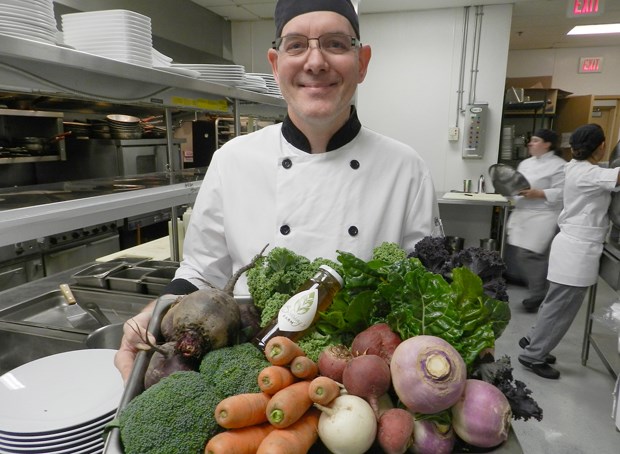Hungry casino goers will not have to rely on lady luck for a dose of fine-tasting produce when they step away from the slots and tables for a bite to eat.
That’s because officials at the River Rock Casino Resort have enlisted the services of The Sharing Farm Society to provide a small supply of locally grown, organic produce to its restaurants.
The arrangement sprang up after a group of executives from the casino volunteered their time this summer to clean freshly harvested garlic and help clear up part of the farm which principally supplies produce for the Richmond Food Bank and other local charitable groups.
When they saw what was being accomplished at the west Richmond site, they decided to figure out a mutually beneficial agreement where the farm would become a supplier to the casino and reap some much-needed revenue for its continued operations.
But because the farm is first and foremost a charitable organization that, on average, provides fruits and vegetables that can end up on the plates of an estimated 1,500 to 1,900 people each week, a fine balance had to be struck between farming for donations and a cash crop, said James Gates, manager at The Sharing Farm, adding this is not the first time the farm has sold its produce.
In the past, Gates said it has supplied some local restaurants on a small scale. And it has set up a stall at the Steveston Farmers and Artisans market.
But having the casino as a client takes that up a notch in terms of volume. So far, the agreement has seen the casino purchase between $400 - $600 worth of produce on a weekly basis.
Gates said the ideal division between donations and commercial sales is 70 and 30 per cent respectively. And that 30 per cent could increase in yield as the farm looks to serve other potential clients by capitalizing on an extra half-acre of land it received this year that was used for bee foraging plants, but could be used to grow produce.
So far, the casino has taken delivery of kale, beets, potatoes, squash and even honey produced at the farm.
“We understand the farm is not a commercial supplier for the likes of us, but at the same time we saw a way of being able to help them out with what they do,” said Karsten Purbs, the
casino’s director of food and beverage.
But even with the limited amount of locally grown organic produce the casino is buying, it has made an impact with the food staff.
“I had one of our chefs the other day say those were some of the best green beans they’ve used,” Parbs said.
To date, the produce has been used across the casino’s food outlets, including its upscale restaurant, Tramonto, the buffet, Curve restaurant and even the food court.
The casino will also be helping promote the farm by posting where the local supply of organic items come from.
In the future, Purbs said there’s a possibility the farm will be able to supply produce tailored to the casino’s needs that will further highlight the local aspect in featured menu items.
Plus, there’s been some initial talk the casino will start producing its own compost and providing a portion of it to the farm, which will aid in the growing process and complete the cycle of produce, consume and recycle.



